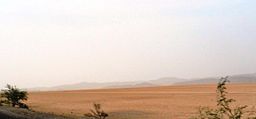Grand Bara
| Grand Bara | |
| Desert | |
|
Grand Bara Desert
|
|
| Country | |
|---|---|
| Regions | Ali Sabieh Region, Arta Region, Dikhil Region |
| Area | 180 km2 (69 sq mi) |
The Grand Bara (Somali: Baadha Wayn), Bara Wein or Bada Wein, is a desert in southern Djibouti. It consists of large areas of sand flats, with sparse, semi-desert and desert grasses and scrub vegetation. A road built in 1981 passes through the area, connecting the capital Djibouti City with the south. Prior to the arrival of the French, the extremely arid interior was inhabited primarily by the Issa Somali.
The Grand Bara and Petit Bara are the remains of dried up lake beds. They form vast arid plains in the centre of Djibouti and mark the delimitation of the volcanic part of the country from the sedimentary part. The clay of which they are formed is poorly drained and water collects here in the rainy season and this is followed by the growth of grasses.
Djibouti has few paved roads; it has been estimated that there are about 2,900 km (1,802 mi) of roads, only about 12% being paved, and fewer than half being serviceable throughout the year. In 1981, a road across the Grand Bara was built, linking the capital with the south. It is about 40 km (25 mi) long.
The Grand Bara is part of the Ethiopian xeric grasslands and shrublands ecoregion. Large mammals occurring in this area include the Beira antelope (Dorcatragus megalotis), Dorcas gazelle (Gazella dorcas), Soemmerring's gazelle (Gazella soemmerringii), Salt's dik-dik (Madoqua saltiana) and gerenuk (Litocranius walleri). Few Beisa oryx (Oryx beisa) remain after great hunting pressure. The Berbera gerbil (Gerbillus acticola) is endemic to this region as are Arnold’s leaf-toed gecko (Hemidactylus arnoldi) and the northern sand gecko (Tropiocolotes somalicus). Archer's lark (Heteromirafra archeri) is the only endemic bird species.
...
Wikipedia

